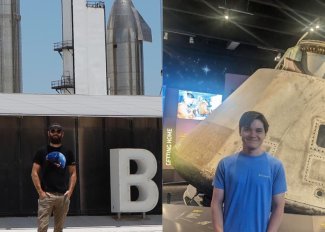
When young children are asked what they want to be when they grow up, a common answer is astronaut. While two Ohio Northern University students might not be the next to explore space, their out-of-this-world internship experiences gave them hands-on training on rockets and supporting space science.
Colton Wasserbeck spent his summer internship at SpaceX’s Rocket Development Facility in McGregor, Texas, while Jonathan Geisler interned at the Fuel Cell Testing Laboratory and Zero-G facilities at NASA Glenn Research Center in Cleveland, Ohio.
Geisler, a native of Dublin, Ohio, is an electrical engineering major with minors in computer science and applied mathematics. He worked as an electrical engineering pathways intern while with NASA working at the Zero-G drop tower and individual projects revolving on planning and designing future facility upgrades.
At SpaceX, Wasserbeck, a native of Prospect, Ohio, is a mechanical engineering and physics dual major with a minor in chemistry and worked as a test equipment engineering intern. A typical day included building and maintaining equipment required to test rockets and rocket engines, as well as analysis, procuring parts and equipment, creating drawings and more.
Both Wasserbeck and Geisler said their well-rounded education from ONU set them up for internship success, teaching them how to be critical thinkers and problem solvers.
“All of my engineering courses helped me very much in this internship. I use concepts from many of them every single day. Engineering knowledge is absolutely vital to not being entirely lost at a place like SpaceX,” Wasserbeck said. “My physics courses have also been invaluable to me. Physics teaches you that there are things out there that are hard, unchangeable facts of the universe and the sooner you realize that, the sooner you can start finding creative ways to use those facts to find solutions to real problems.”
He added chemistry is also one of his favorite subjects because learning how atoms and molecules work in the physical world help scientists understand many other subjects.
Geisler was grateful to receive hands-on training needed to succeed in his field.
“Having some introduction to AutoCAD and other modeling programs was super beneficial and helped me learn new software as needed for my projects,” said Geisler. “Knowing how to document my work turned out to be very important also, because even though the facilities I worked in have been around for a long time, they are constantly updated and the systems must be manageable in the future.”
Mentoring also made a positive difference during the internships.
“One thing I really have loved is the culture and the people at SpaceX,” said Wasserbeck. “Everyone there is incredibly talented and possesses a drive that I've never seen before. At SpaceX everyone is passionate about the mission. They're not just there for a paycheck—they care about advancing humanities capabilities in space and drive towards allowing humans to reach further and further into it.”
“From the beginning of my internship, one of the most enjoyable parts of the job was the people," Geisler added. "The environment at the center was very collaborative and encouraged learning from everything you do. Everyone was happy to explain any aspect of what they're doing, and there was a lot of value placed on understanding why certain steps exist, rather than just following procedures. My assigned mentor from the very beginning also did an incredible job giving me relevant work that would let me gain experience in different areas, and provided me with guidance when I needed help. Over the two terms I was there though, I was able to work with many more talented engineers who took on the role of a mentor in one form or another."